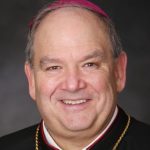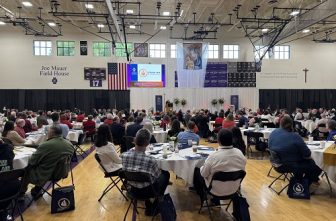I recently had the privilege of presiding at the funeral of Bishop Paul Swain, the bishop emeritus of the Diocese of Sioux Falls. A man of deep faith with a strong sense of service, Bishop Swain had been extremely helpful to me when I was first named to this archdiocese. The fact that we had both worked as lawyers before ordination gave us a common language and frame of reference.
Recalling his many kindnesses to me, I was particularly grateful for the opportunity to preach at his funeral Mass. The occasion, however, reminded me that I get more than my share of butterflies in the stomach whenever it falls to me to “break open the Word” in the presence of brother bishops. I cannot even imagine how it would feel if I ever had to preach to the pope!

Fortunately for me, the position of Preacher to the Pontifical Household is already taken: For the last 42 years, Raniero Cantalamessa, an Italian Capuchin friar, has borne the responsibility of that office, preaching each Advent and Lent to the pope and his most senior staff. He’s done it so successfully that Pope Francis named him a cardinal in 2020. His Eminence is a great scholar but an even better preacher.
In the first of his three Advent homilies this year, Cardinal Cantalamessa painted an intriguing picture of Christ’s coming: Imagine being separated from Jesus by a door that opens from the inside and outside at the same time with two keys, one being in the hand of Jesus and the other in ours. We cannot open the door without the help of God and Jesus chooses not to open it without our cooperation. Cardinal Cantalamessa suggested that there are three ways that the door can be opened: faith, hope and charity, so distinct that we could even speak of a “door of faith,” a “door of hope” and a “door of charity.”
While we will have to wait until Dec. 17 to hear Cardinal Cantalamessa preach on the “door of charity,” I’m pleased that this issue of The Catholic Spirit is already shedding Advent light on this theme as it addresses the “spirit of giving.” As I recently mentioned in the pastoral letter, “You Will be My Witnesses,” we are blessed to have so many examples of “foot washing” in this local Church, as our brothers and sisters imitate Jesus in pouring themselves out in service to others, giving from the heart.
Even though the “spirit of giving” needs to be a priority throughout the year, Advent seems to be a particularly fine time for exploring the door of charity. So many of our practices and traditions at this time of year lead us to and through that door.
For the 13 years that I worked in Rome, I was blessed by the example of Mother Teresa’s Missionaries of Charity. Each year as Christmas approached, the sisters would creatively construct a Nativity scene in their chapel that included an empty box placed where we would normally put the manger. All during Advent, when no one else was looking, the individual sisters would put single pieces of straw in the box, representing some act of charity that they had accomplished that day. By the time Christmas came, the box would inevitably be overflowing with straw, signifying the anonymous works of charity that the sisters had embraced that Advent to prepare for the coming of Christ.
While I would imagine that those many works of charity, no matter how small, had a great benefit for others, I am equally confident that they had an important impact on the sisters as well as they prepared for the coming of Christ. In his 2020 encyclical letter, “Brothers and Sisters All,” Pope Francis reminds us that we “cannot live, develop and find fulfillment” except in the sincere gift of self to others (n. 87). He went on to stress that it is in the act of giving of ourselves, the encounter with our brothers and sisters, that we come to fully know who we are. It’s only when we know who we are that we can begin to appreciate the importance of Christmas and prepare for the return of the Master who washed the feet of his disciples and urged us to do the same.
This Advent, let’s be grateful for the many meaningful opportunities that we have to fill up our mangers with the straw of charity, giving of ourselves in our homes, parishes and communities. May we humbly honor in that way the King who came to serve rather than to be served.




